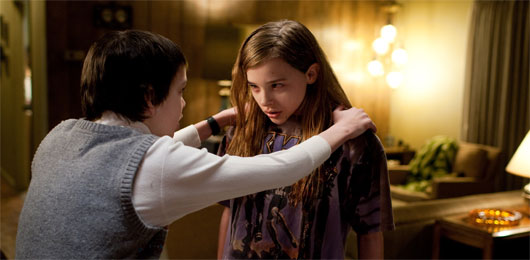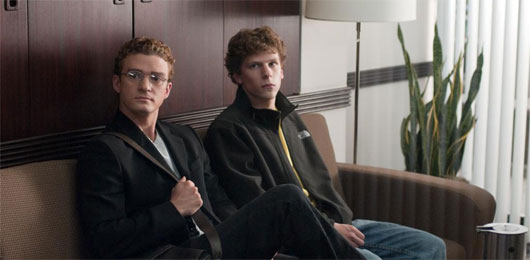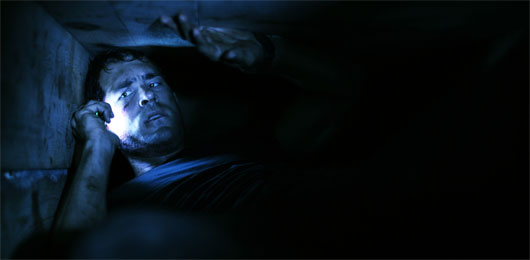 Choose life, Danny Boyle told us in Trainspotting. That seemed to be dripping in irony, but here, 14 years later, he really, really means it, directing one of the most inspiring tales of human endurance. To answer the obvious questions first, yes, its grueling, yes the crucial scene is agonising to watch, but believe it or not you will emerge from the cinema feeling more full of life and compassion than before you went in.
Choose life, Danny Boyle told us in Trainspotting. That seemed to be dripping in irony, but here, 14 years later, he really, really means it, directing one of the most inspiring tales of human endurance. To answer the obvious questions first, yes, its grueling, yes the crucial scene is agonising to watch, but believe it or not you will emerge from the cinema feeling more full of life and compassion than before you went in.
Its the true story of Aron Ralston, a super-fit, very smart twenty-something who loves the outdoors. One Friday he drives out to Utah to cycle and hike across a famous crack in the canyon. After a slight fall off his bike he meets a couple of fellow hikers, Kristi and Megan, and urges them to push themselves by following him through a dangerous path. He films the ensuing adventure on his video recorder (remarkably the actual one Ralston used). He then leaves the girls to their walk and carries on alone. A simple slip and half a second later, he falls down a ravine and has his right hand pinned by a 300lb rock.
| 127 Hours Trailer |
Astonishingly that is all handled in the pre-credit sequence, but tells us all we need to know about what is to come. Boyle uses every trick in the book to tell a story which, visually, should be limited after all, its the story of a man trapped in a dark ravine for 127 hours. However, as Ralstons food, then water, runs out, and he begins to dream, and hallucinate, the film constantly surprises in its storytelling. While the beauty of the landscape and the pulsating music engage the eyes and ears, its the insight into Ralstons struggle for life which engages the heart. While he is trapped he thinks about his life and relationships, especially his dumped girlfriend Rana (Poesy) and his adoring parents.
Slowly it emerges that Ralston is not the most likeable of chaps in fact he and Mark Zuckerberg from the Social Network should get together and form a club for anti-social dweebs but he learns the lesson which fate or nature seems to be teaching him. In one remarkable sequence he becomes a guest on his own breakfast TV show, suddenly realising he cannot live his life entirely on his own. Even a daily sighting of a raven gives him some hope.
| 127 Hours – Aron Falls Into Canyon Clip |
[SPOILER ALERT] As everyone now knows, Ralston escaped by cutting off his own arm, a sequence which certainly pulls no punches but is absolutely necessary in the context. Its also followed by two of the most remarkable words in any film you are likely to see this year, as Ralston makes his escape. [SPOILERS END]
James Franco has been chosen to host the Oscars this year, a very strange choice as he is almost certain to be nominated for Best Actor, and may even win. Its a remarkable performance, never going for the obvious sympathy, utterly convincing in communicating Ralstons anger, fear and in the end resignation of his fate. His face during the rescue scene at the end is of a man almost embarrassed rather than terrified. In the brief supporting cameos Poesy is eye-catching as the girlfriend whose memory keeps him going.
Overall verdict: Gritty but gripping and rewarding story of the human spirit, brilliantly brought alive by Boyles vision. Much like Slumdog Millionaire youll feel better for having seen it.
Reviewer: Mike Martin
 Vampires have been having a bit of a bad time recently. Gone are the days of the Lost Boys, Nosferatu and Kathryn Bigelows criminally underrated debut Near Dark. At the moment, if theyre not sparkly abstinence promoting protagonists of a middle-aged womans glorified fan fiction (Twilight), then theyre glossed up, morally dubious, sexually obsessed yuppie types (True Blood). Its a sad fall from grace for the princes of darkness and as long as bored teenagers continue to feel angsty every time they have to stare real life in the face, it seems as though the descent will continue for the foreseeable future.
Vampires have been having a bit of a bad time recently. Gone are the days of the Lost Boys, Nosferatu and Kathryn Bigelows criminally underrated debut Near Dark. At the moment, if theyre not sparkly abstinence promoting protagonists of a middle-aged womans glorified fan fiction (Twilight), then theyre glossed up, morally dubious, sexually obsessed yuppie types (True Blood). Its a sad fall from grace for the princes of darkness and as long as bored teenagers continue to feel angsty every time they have to stare real life in the face, it seems as though the descent will continue for the foreseeable future. There are some films which stay with you for a long, long time Pans Labyrinth, Secrets In Their Eyes, Lives Of Others. This stunning Iranian drama belongs in that category, and who knows, when the history of cinema is finally written, it might even climb above those masterpieces. It is brave, powerful beyond words, brilliantly acted and stunningly realized.
There are some films which stay with you for a long, long time Pans Labyrinth, Secrets In Their Eyes, Lives Of Others. This stunning Iranian drama belongs in that category, and who knows, when the history of cinema is finally written, it might even climb above those masterpieces. It is brave, powerful beyond words, brilliantly acted and stunningly realized.  The Social Network is a film about the setting up of Facebook, which isnt really that interested in the actual truth of what happened. After all, while there were some courtroom machinations and back-stabbing, to be honest, the story on its own isnt really that scintillating. Instead David Finchers film, based on Aaron Sorkins screenplay, has a slightly bigger objective, massaging the actual truth to reveal the deeper reality and create a truly compelling chronicles of our times.
The Social Network is a film about the setting up of Facebook, which isnt really that interested in the actual truth of what happened. After all, while there were some courtroom machinations and back-stabbing, to be honest, the story on its own isnt really that scintillating. Instead David Finchers film, based on Aaron Sorkins screenplay, has a slightly bigger objective, massaging the actual truth to reveal the deeper reality and create a truly compelling chronicles of our times. While a film about a man trapped in a box with a limited amount of air sounds like a great idea, when you try to stretch that out over the course of 95 minutes, youre in danger of turning a claustrophobic nightmare into boring tedium. While Buried often seems in danger of dissolving into a mess, it thankfully overcomes this thanks to great direction from Rodrigo Cortes and a very effective performance by Ryan Reynolds.
While a film about a man trapped in a box with a limited amount of air sounds like a great idea, when you try to stretch that out over the course of 95 minutes, youre in danger of turning a claustrophobic nightmare into boring tedium. While Buried often seems in danger of dissolving into a mess, it thankfully overcomes this thanks to great direction from Rodrigo Cortes and a very effective performance by Ryan Reynolds. Is it Halloween already? No, it isnt, so why exactly is this DVD fodder being released in September? Presumably to get the DVD out by the end of October
one things for sure, by the end of November it will be in the bargain bin.
Is it Halloween already? No, it isnt, so why exactly is this DVD fodder being released in September? Presumably to get the DVD out by the end of October
one things for sure, by the end of November it will be in the bargain bin.
You must be logged in to post a comment.